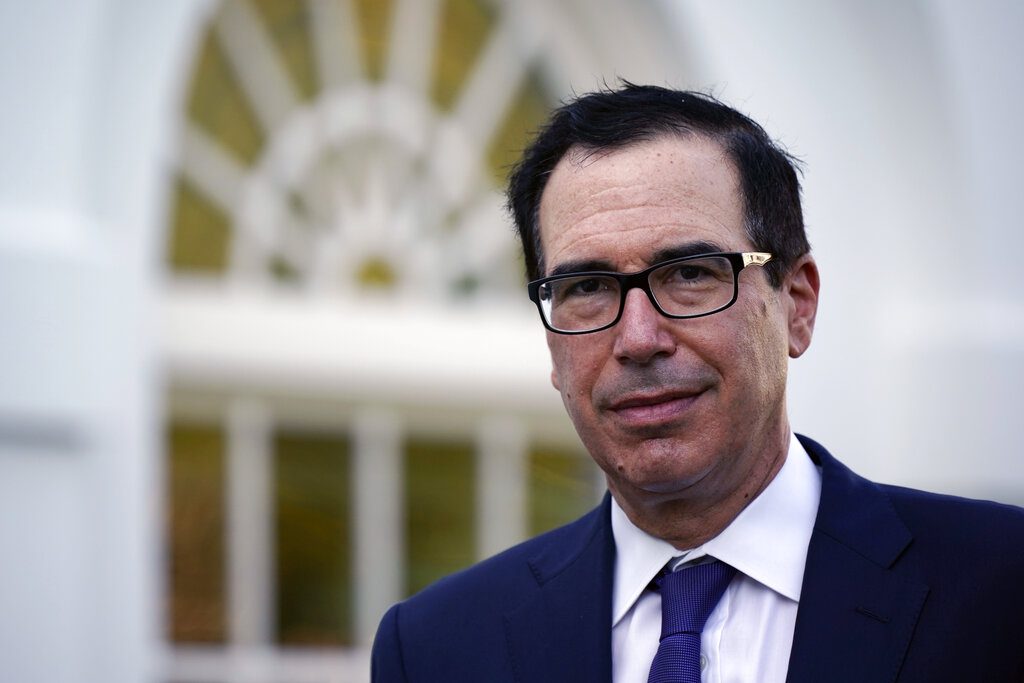Former Treasury Secretary Steven Mnuchin announced on Thursday that he intends to assemble a group of investors to buy TikTok following the approval of a bill by the House that threatens to ban the popular video app in the U.S. if its Chinese owner does not sell its stake.
Mnuchin, who served under President Donald Trump, revealed during an interview on CNBC’s “Squawk Box” that he has been in talks with several people to form an investor group to acquire the well-liked social media company. He did not provide any specifics about the potential members of the group or the estimated value of TikTok.
Mnuchin emphasized, “This should be owned by U.S. businesses. There’s no way that the Chinese would ever allow a U.S. company to own something like this in China.”
TikTok did not respond to a request for comment.
The House bill, which was approved by a vote of 352-65, is now headed to the Senate, where its future is uncertain. Lawmakers in the Senate have indicated that the bill will be subject to a comprehensive review. Should it pass in the Senate, President Joe Biden has stated he will endorse it.
House lawmakers took action due to concerns that TikTok’s current ownership arrangement poses a national security risk. Politicians from both parties and government officials have expressed worries that TikTok’s parent company, ByteDance, could be compelled by Chinese authorities to provide data on American users, spread pro-Beijing messages, or censor topics unfavorable to the Chinese government.
For its part, TikTok has consistently denied that it could be manipulated by Chinese authorities. The company insists that it has never shared U.S. user data with the Chinese government and has no intention of doing so even if requested. To date, the U.S. government has not presented evidence demonstrating that TikTok has shared such information with Chinese authorities.
When asked if the Mnuchin consortium could alleviate national security concerns about TikTok, White House national security spokesman John Kirby stated that the administration's focus was on providing “context and information” to the Senate.
The dispute over the platform is occurring at a time when U.S.-China relations have evolved into a strategic rivalry, particularly in areas such as advanced technology and data security, which are viewed as critical to each country’s economic strength and national security.
If the House bill is passed and enacted, ByteDance would have 180 days to sell the platform to a buyer approved by the U.S. government. It would also prevent ByteDance from controlling TikTok’s algorithm, which customizes users’ video feeds based on their preferences.
In addition to Mnuchin, other investors, such as “Shark Tank” personality Kevin O’Leary, have expressed interest in acquiring TikTok's U.S. operations. However, experts have noted that it could be challenging for ByteDance to find a buyer capable of completing the purchase within a few months.
Major tech companies are considered to be the most suitable candidates for such an acquisition, but they would likely encounter rigorous scrutiny from antitrust regulators, a point underscored by Mnuchin.
Mnuchin mentioned during the interview, “I don’t think this should be controlled by any of the big U.S. tech companies. I think there could be antitrust issues on that. This should be something that’s independent so we have a real competitor. And users love it, so it shouldn’t be shut down.”
He also mentioned that the app would have to be reconstructed in the U.S. using new technology.
In many ways, social media companies have become battlefields for political disputes about how to manage false information while safeguarding freedom of speech. Mnuchin’s attempt to purchase TikTok comes as Trump and his supporters have frequently complained about what they perceive as social media silencing conservative voices.
Trump himself has expressed opposition to the House bill, stating that banning TikTok would benefit its competitor, Facebook, which he continues to criticize for his 2020 election defeat. Some other Republicans who are against the bill argue that the U.S. should simply inform Americans about TikTok's security concerns and let them decide whether they want to use the platform.
Meanwhile, some Democrats have raised concerns about singling out one company when other social media platforms also gather large amounts of user data. Opponents of the bill also argue that it would disrupt the lives of content creators who depend on the platform for income and violate the First Amendment, which protects freedom of speech.
This isn’t the first time a TikTok sale has been in play.
When Mnuchin was Treasury secretary, the Trump administration negotiated a deal in 2020 that would have seen U.S. companies Oracle and Walmart acquire a significant stake in TikTok for national security reasons.
The deal would have also tasked Oracle with hosting all of TikTok’s U.S. user data and securing computer systems to meet national security requirements. Microsoft also made an unsuccessful bid for TikTok that its CEO, Satya Nadella, later described as the “strangest thing” he had ever worked on.
Instead of congressional action, the 2020 arrangement was in response to a series of executive actions by Trump targeting TikTok.
But the sale never went through for a number of reasons. Trump’s executive orders were held up in court as the 2020 presidential election neared. China also imposed stricter export controls on its technology providers.









